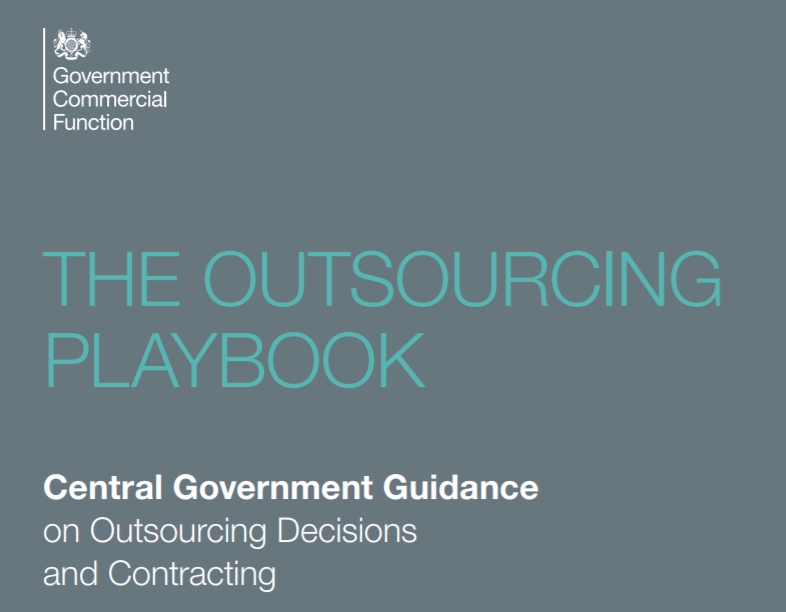Outsourcing playbook
The government’s Outsourcing Playbook, designed to improve how government works with industry and deliver better public services, was launched on February 20, 2019 by Cabinet Office Minister, Oliver Dowden.
The Playbook is intended to ensure the government gets more projects right from the start, engages with a diverse and healthy marketplace of companies, including small businesses and charities, and is ready when things go wrong.
This follows reforms announced by the Chancellor of the Duchy of Lancaster and Minister for the Cabinet Office, David Lidington, to ensure that government procurement is fit for the future, including putting social values at the heart of public service delivery.
New measures announced at the launch include changes to how government allocates risk between itself and its suppliers, ensuring contracts are set-up for success, and for the public to be provided with the best possible service.
The government is also taking steps to improve the design of outsourcing projects from their inception. New complex contracts will be piloted with the private sector before rolling out fully, enabling the government to learn from experience and deliver better public services.
Speaking to CBI business leaders at the launch, Oliver Dowden said:
“Outsourcing can deliver significant benefits, including value for money and more innovative public services. Our new measures will improve how the government works with industry and provide better public services for people across the country.
“I can today provide reassurance that the Playbook makes explicit that, when designing contracts, departments must seek to mitigate, reduce and then allocate risks to the party best able to manage it. A more considered approach to risk allocation will make us a smarter, more attractive client to do business with.”
Jon Lewis, the CEO of Capita, one of the suppliers which government worked with to develop the new measures, said:
“Capita is working closely with government to develop these reforms. This is a sea-change, both recognising the vital contribution the private sector makes in delivering first-rate public services, and then finding ways to do this even better.
“These new ways of working will place a stronger focus on establishing partnerships based on mutual trust and a joint focus on positive outcomes. This is fundamental to the successful procurement and delivery of public-sector contracts.”
Further measures in the Playbook include:
- Key performance indicators from every new outsourcing contract will be made publicly available.
- Resolution plans (living wills) for the rare event of a supplier’s corporate failure.
- Departments will be required to publish their upcoming requirements, to help suppliers plan ahead.
- Make-versus-buy decisions to identify when it is best to deliver public services in-house or when there is benefit to drawing on the expertise of the private sector.
You can find the Playbook at: https://www.gov.uk/government/publications/the-outsourcing-playbook
[edit] Related articles on Designing Buildings Wiki
- Business process outsourcing (BPO).
- Business model.
- Carillion.
- Construction organisation design.
- Construction organisations and strategy.
- Consultancy playbook.
- Consultancy vs contingent labour.
- Critical service contracts.
- Critical suppliers.
- Expected market cost.
- Funding options.
- Government procurement post-Carillion.
- Insourcing.
- Joint venture.
- Mixed economy.
- Model Services Contract MSC.
- Partnering.
- PFI.
- Public sector dependent suppliers.
- Sourcing playbook.
- Spark framework RM6094.
- Suppliers.
- Types of construction organisation.
- Vested outsourcing.
Featured articles and news
The first line of defence against rain, wind and snow.
Building Safety recap January, 2026
What we missed at the end of last year, and at the start of this...
National Apprenticeship Week 2026, 9-15 Feb
Shining a light on the positive impacts for businesses, their apprentices and the wider economy alike.
Applications and benefits of acoustic flooring
From commercial to retail.
From solid to sprung and ribbed to raised.
Strengthening industry collaboration in Hong Kong
Hong Kong Institute of Construction and The Chartered Institute of Building sign Memorandum of Understanding.
A detailed description from the experts at Cornish Lime.
IHBC planning for growth with corporate plan development
Grow with the Institute by volunteering and CP25 consultation.
Connecting ambition and action for designers and specifiers.
Electrical skills gap deepens as apprenticeship starts fall despite surging demand says ECA.
Built environment bodies deepen joint action on EDI
B.E.Inclusive initiative agree next phase of joint equity, diversity and inclusion (EDI) action plan.
Recognising culture as key to sustainable economic growth
Creative UK Provocation paper: Culture as Growth Infrastructure.
Futurebuild and UK Construction Week London Unite
Creating the UK’s Built Environment Super Event and over 25 other key partnerships.
Welsh and Scottish 2026 elections
Manifestos for the built environment for upcoming same May day elections.
Advancing BIM education with a competency framework
“We don’t need people who can just draw in 3D. We need people who can think in data.”





















